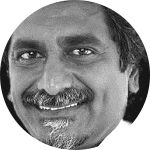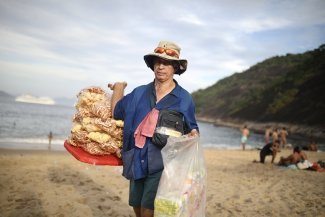Drought is a frequent and brutal visitor to the Lake Turkana region in the north of Kenya. The rains seldom come and the lake is drying up.
So is the hope of the Turkana, a proud people. They are mainly pastoralists. But the grazing lands are fast disappearing as are the fish in the rapidly receding lake. Heavily armed marauding bandits from the Horn of Africa regularly raid their lands and seize their cattle.
“They take our wealth and our food. Our cows are our bank. We are alone. There is no government here to protect us. It is the rule of the gun. Our homes are torched, our innocent are murdered. They want to drive us from our land. Our children are not safe. They must go to the city.”
Their poverty is driven by climate change, a precursor to the new resource wars that are to be fought over water, land, food and scarce resources.
The poverty is chronic, systemic and persistent. It leaves many in despair, abandoned by the political and economic elites in their own governments and the world.
This story is repeated in the many villages I have been to in the Indian sub-continent, in the slums of Africa and Asia where families live in a space that is barely bigger than the bathroom of middle-class families. People of these communities feel that God has forsaken them.
Official reports suggest “enormous progress has been made towards achieving the Millennium Development Goals, (MDGs). Global poverty continues to decline, more children than ever are attending primary school, child deaths have dropped dramatically; access to safe drinking water has been greatly expanded…”
While there’s no doubt that we have made progress, I wonder when these gains will trickle down to the billion people that still eke their very existence at the edges of our humanity.
The World Bank 2011 World Development report on Conflict, Security and Development, the Advisory Committee for which I sat on, found that at least one in three people live in conflict ridden countries and that no country that has experienced serious conflict will achieve any MDG.
On Monday morning at the opening of a global conference on hunger, nutrition and climate justice, the Irish President Michael Higgins described global hunger as “the grossest of human rights violations” and the greatest ethical challenge facing the global economy.
In illustrating the failure of the global development system he said further:
“What is required is a robust regulatory framework which protects our fragile and threatened environment and which respects the right of small landholders to remain on their land and retain access to water sources.”
President Higgins has his finger on the pulse of the rising anger in the world.
People are losing trust in their leaders and their positive role in political, economic and even in civil society.
The bottom half of humanity sees, and experiences, a new Apartheid that divides a global rich and predatory minority from the overwhelming majority’s growing poverty, joblessness and social inequality.
A high-level panel, appointed by UN Secretary-General Ban Ki-moon, is expected to submit its final report on a post-2015 development agenda when it meets in New York at the end of May. There is an urgency to develop an alternative vision of the world we want.
The Millennium Declaration in 2000 promised that “men and women have the right to live their lives and raise their children in dignity, free from hunger and from the fear of violence, oppression or injustice. Democratic and participatory governance based on the will of the people best assures these rights."
The current ferment in the world demonstrates that patience of the forgotten people is running out.
Drivers
The ’youth bulge’ in the developing world is alienated by the corruption in our political and economic systems.
Citizens are demanding voice and transparency. They want jobs and social protection, safety and justice – all issues that were not included in the original MDGs. We need to address the underlying drivers of poverty, now.
The data itself has hidden a growing social and economic inequality which has risen dramatically in the world.
We need to go beyond measuring progress as a set of narrow input and output indicators.
Let us disaggregate the laudable goal we set of the reduction of poverty by half by 2015.
Development bureaucrats claim victory in many of the discussions I have attended.
Poverty has been defined as an income of less than 1.25 US dollars a day, but because figures are not broken down, the fact that China accounts for the bulk of this success is ignored. Sub-Saharan Africa, on the other hand, is not on track on its poverty reduction and will fall short of nearly all the goals. But more importantly, here’s a question that many pose to me:
“Name one minister or bureaucrat in any global institution who can support a family on 1.25 US dollars a day.”
We need a new framework that addresses sustainable development holistically; human rights, economic, social and environmental rights.
At its core it has to place human well-being and address the fact that our consumption patterns have pushed the planetary resources to the limit.
A top-down, donor-driven and intergovernmental process that led to the MDGs is unlikely to work today.
We need a bottom-up process, which co-creates the vision of our future world, that will create the tools that allows communities at a grass root level to ensure there is transparency and accountability of those in power.
To be able to measure progress, we need reliable data in our countries.
But we need to unpack our morbid fascination with evidence that just satisfies ’bean counters’ in foreign capitals and concentrate on data that meets the true needs of the poor and improves the real capacity and quality of service delivery.
So how can we legitimise the process towards a new future we hope to agree? We need to recognise the need for:
- Bold leadership at a local, national and global level and a set of shared rights and responsibilities across the public, private and civil society sectors
- Open Data networks that, building accountability from the bottom up, create tools for citizens to hold the leaders accountable
- The acceptance of universality of human rights and its inter-connectedness to environment and poverty
- Understanding that growing inequality within countries is fueling corruption and social tensions
- An inclusive and participatory process in which the voices of the poor are heard in the corridors of power
- Comprehensive development framework that integrates the discussions for a post-MDG agenda and ’Sustainable Development Goals’ (SDGs) as agreed at the Rio+20 summit in June 2012
Today, over 1.3 billion people around the world have no access to electricity. What is the value of universal education when kids are taken out of school and sent to find firewood or herd the family livestock?
Today, I am reminded that Nelson Mandela once said: “Overcoming poverty is not a task of charity, it is an act of justice. Like slavery and apartheid, poverty is not natural. It is man-made and it can be overcome and eradicated by the actions of human beings. Sometimes it falls on a generation to be great. You can be that great generation. Let your greatness blossom.”
Sekunjalo ke nako. Now is the time to act.
This is an edited version of an opinion piece that first appeared on Daily Maverick









